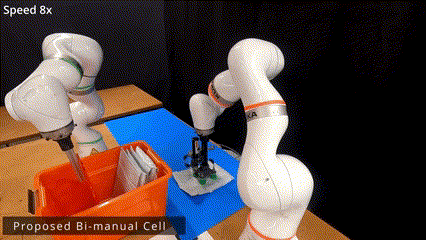Simulation-Assisted Learning for Efficient Bin-Packing of Deformable Packages in a Bimanual Robotic Cell
Omey M. Manyar1,*, Hantao Ye1,*, Meghana Sagare1, Siddharth Mayya2, Fan Wang2, Satyandra K. Gupta1
1University of Southern California, 2Amazon Robotics, *Equal contribution
IROS 2024
Project Page | Video | Paper
This repository is the official implementation of the paper. This code is intended for reproduction purposes only. Current implementation does not support extensions. The objective of this repository is to provide the reader with the implementation details of the learning framework proposed in the IROS 2024 paper.
- Simulation-Assisted Learning for Efficient Bin-Packing of Deformable Packages in a Bimanual Robotic Cell
To simplify the process of setting up the development environment, we use PDM for Python package management and virtual environment management.
- Ubuntu >= 20.04 (Didn't test on other platforms)
- Python >= 3.8 (For PDM installation)
- Anaconda/Miniconda (For virtualenv creation)
To install PDM, run the following command:
curl -sSL https://pdm-project.org/install-pdm.py | python3 -Clone the project repository and navigate into the project folder:
git clone https://github.com/RROS-Lab/IROS2024-Bin-Packing.git
cd IROS2024-Bin-PackingNext, create a Python 3.10 virtual environment using PDM and select conda as backend:
pdm venv create --with conda 3.10To verify the virtual environment was created successfully, use:
pdm venv listYou should see output like:
Virtualenvs created with this project:
* in-project: /path/to/IROS2024-Bin-Packing/.venvHere, in-project is the default name of the virtual environment. If you'd like to specify a custom name for the environment, use:
pdm venv create --with conda --name my-env-name 3.10To activate the virtual environment and install dependencies, run:
eval $(pdm venv activate in-project)
pdm installAll necessary dependencies will be installed after running the command above.
pdm add requests # add requests
pdm add requests==2.25.1 # add requests with version constraint
pdm add requests[socks] # add requests with extra dependency
pdm add "flask>=1.0" flask-sqlalchemy # add multiple dependencies with different specifiersPlease follow PDM documentation for details
$ pwd
# ensure your current working dir is the repo
path/to/IROS2024-Bin-Packing
$ python -m src.sim_env.env -h environment
# The help information for running simulation
usage: env.py [-h] [--data_filename DATA_FILENAME] [--visualize VISUALIZE] [--num_threads NUM_THREADS]
[--num_scenes NUM_SCENES]
options:
-h, --help show this help message and exit
--data_filename DATA_FILENAME
Filename to save data to (default: data.csv)
--visualize VISUALIZE
Visualize the scene (default: False)
--num_threads NUM_THREADS
Number of threads to use, not working when visualize enabled (default: 12)
--num_scenes NUM_SCENES
Number of scenes to generate (default: 400)
$ python -m src.sim_env.env --visualize True --num_scenes 10
# will create and visualize 10 scenes using MuJoCo passive_launcher and
# store data in src/sim_env/data/sim_exp/data.csvFor boosting data generation, we also provide a shell script to execute
sh ./src/sim_env/scripts/multiple_run.sh
# will create 25 data files generated by env.py in its default config and
# store data files in src/sim_env/data/sim_exp/data_{idx}.csvThe role of this model is identify cases that are considered unrecoverable in terms of packing score.
An example dataset is also provided for reproduction of our studies (google drive link). Place the two csv files in the following directory: ./src/packing_score_predictor/dataset/processed_data/.
In order to perform training kindly run the following command in terminal:
cd src/packing_score_predictor
python -f train_classifier.py -f training_params_classifier.jsonThis will generate the model for detecting failure cases. Running the script generates a confusion matrix representative of the final classification performance.
The packing score model is the model 1 (Suction Robot) and model 2 (Paddle Robot/In-bin Robot) state-action model that predicts the packing score for given state and actions.
An example dataset is also provided for reproduction of our studies.
In order to perform training of the model with the given dataset, run the following command:
cd src/packing_score_predictor
python train_score_predictor.py -f training_params_score.jsonThe action prediction module is the online optimizer that computes the actions for the robots.
We've provided a pre-trained checkpoint for the packing score predictor. The action prediction module takes this pre-trained checkpoint as the input and predicts the delta actions for the bi-manual robots.
In order to perform inference. You can update the state values, based on the dataset values and perform inference. This can be done by varying line 160 in action_predictor.py. For state definitions refer to lines 73-92. in action_predictor.py.
Run the following command for inference:
cd src/action_predictor
python action_predictor.py -f predictor_config.json@INPROCEEDINGS{manyar_iros_2024,
author={Manyar, Omey M. and Ye, Hantao. and Sagare, Meghana and Mayya, Siddharth and Wang, Fan and Gupta, Satyandra K.},
booktitle={2024 IEEE/RSJ International Conference on Intelligent Robots and Systems (IROS)},
title={Simulation-Assisted Learning for Efficient Bin-Packing of Deformable Packages in a Bimanual Robotic Cell},
year={2024},
month={Oct},
address="Abu Dhabi, UAE",
volume={},
number={},
pages={},
doi={}}